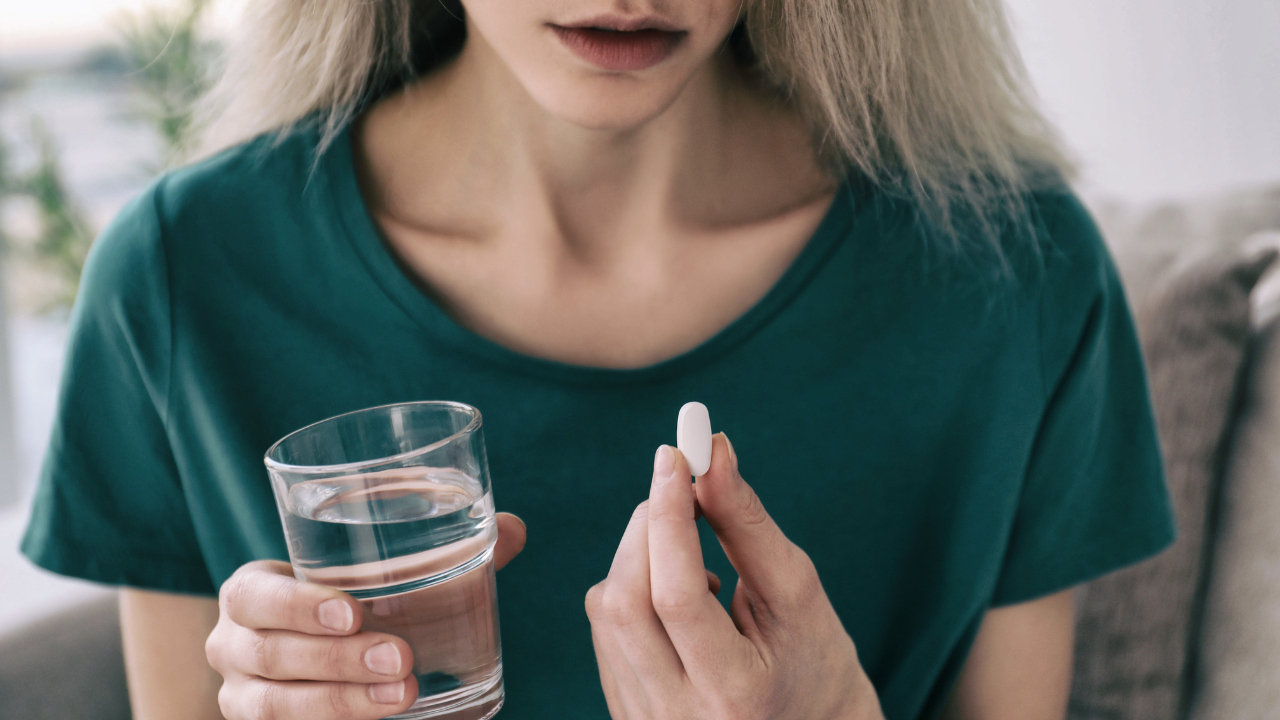What Causes the Sexual Side Effects of Antidepressants in Women?
I was on an antidepressant medication called Serdep for just over a month.
I took it because I wasn’t coping well at the time and was cycling chaotic emotional spirals I couldn’t pull myself out of. Within a week, it leveled me out. But quietly, my joy disappeared. I didn’t want to move my body. I wasn’t curious about life anymore, and nothing lit me up.
My sex drive had evaporated. But also, I couldn’t even feel frustrated about it. All sorts of feelings, both good or bad, were just gone. When I stopped taking Serdep, it took only a few days for sensation to return, & my interest came back and my orgasms returned.
That experience taught me that the impact of antidepressants on sexual function is a full-body shift in how you experience aliveness. And for women, that shift often goes unspoken. SSRIs, SNRIs, tricyclics, and atypicals are prescribed widely to manage negative emotional cycles. And while they can be helpful, sometimes essential for many, what they do to a woman’s capacity to feel and connect to her own sexual system is rarely addressed with depth or care.
This article is about helping you understand how antidepressants affect your sexual body, and what you can do to rebuild sensation and turn-on from the inside out.
Why Women Experience Sexual Dysfunction on Antidepressants
1. Dopamine Suppression: The Root of Lost Desire
Dopamine is the neurotransmitter most directly associated with sexual desire and reward-seeking behavior. When dopamine levels are high, the brain becomes more responsive to pleasure. It registers sexual cues as interesting and worth pursuing.
SSRIs work by increasing serotonin, but high serotonin suppresses dopamine, especially in brain regions like the nucleus accumbens and prefrontal cortex, which are responsible for pleasure anticipation and decision-making. As dopamine decreases, a woman may stop feeling spontaneous desire and struggle to initiate sexual activity, because the chemical that makes sexual stimuli feel exciting has been turned down.
2. Reduced Norepinephrine and Sensory Flatness
Norepinephrine is involved in alertness and genital blood flow. When it’s functioning properly, it works alongside dopamine to enhance attention and sexual focus. But many serotonergic antidepressants, especially SNRIs, disrupt norepinephrine signaling too.
This can reduce vasocongestion (blood flow to the vulva and vaginal canal), leaving the genitals feeling less warm or responsive. The result is what I describe as a feeling if “flatness” or numbness, a distinct lack of aliveness or heat in the pelvic region. Even if touch is present, the body doesn’t respond with the normal signs of arousal.
3. Decreased Nitric Oxide and Genital Blood Flow
Antidepressants can also interfere with nitric oxide synthesis, a compound critical for vascular dilation. In the genitals, nitric oxide helps the clitoris swell and vaginal tissues engorge with blood. When nitric oxide production is reduced, genital engorgement doesn’t occur fully, which limits both sensation and lubrication.
4. Serotonin Receptors That Inhibit Orgasm
High levels of serotonin also activate 5-HT2A and 5-HT2C receptors, which directly inhibit orgasmic release. This is why many women on SSRIs report “hitting a ceiling” during climax, they can get aroused, even feel pleasure, but the release never arrives. It doesn’t mean the body is incapable of climax, but that the neurochemical pathways that allow for full-body release have been chemically blocked or delayed.
5. Suppressed Oxytocin and Emotional Disconnect
Oxytocin is the hormone of bonding and emotional closeness. It’s released during sex and even affectionate touch. But serotonin can blunt oxytocin release, leaving women feeling emotionally detached during sexual activity. This emotional dulling contributes to what I experienced and describe as “being present, but not there.” This is a biochemical disconnect between the limbic system (emotions) and the sexual brain.
6. Long-Term Nervous System Downregulation
Over time, the chronic elevation of serotonin and suppression of dopamine/norepinephrine can downregulate receptor sensitivity. This means the brain becomes less responsive to pleasure cues, and the body stops prioritizing pleasure as a feedback loop. The longer antidepressant therapy continues, the more entrenched these changes can become. Some women experience treatment emergent sexual dysfunction such as Post-SSRI Sexual Dysfunction (PSSD), where numbness or emotional detachment continue long after the medication has been discontinued.
7. Impact on the Sympathetic and Parasympathetic Nervous System
Sexual response involves both the parasympathetic (arousal, engorgement, lubrication) and sympathetic (orgasm, release) nervous systems. Antidepressants interfere with the balance between these two systems. If parasympathetic dominance is suppressed, meaning the body can’t relax into arousal, penetration feels tight and the pelvic floor may stay clenched. Conversely, if the sympathetic system is blocked, orgasm becomes difficult or impossible, no matter how aroused a woman may be.
The Sexual Side-Effects of Antidepressant Medication
Loss of Libido (Low Sexual Desire)
Antidepressants alter the brain’s neurochemical balance, particularly the ratio between serotonin and dopamine. While serotonin is important for mood stability, too much of it can blunt the dopamine system. And dopamine is crucial for sexual motivation and reward anticipation. When dopamine is suppressed, the brain’s pleasure-seeking circuits dim.
Difficulty Becoming Aroused
Arousal is both a psychological and a physiological process. Mentally, it requires access to sexual thoughts and responsive pleasure anticipation. Physically, it depends on a cascade of events, like increased blood flow to the genitals (vasocongestion), lubrication, muscle relaxation, and heightened nerve sensitivity.
Antidepressants interfere at multiple stages of this cycle. By dulling dopamine and norepinephrine activity, they reduce genital blood flow and blunt physical responsiveness. The clitoris and vaginal walls don't swell, the vulva may not feel 'alive' to touch, and the nervous system may fail to signal that this contact is desirable or exciting. A woman may go through the motions of intimacy but feel like her body isn't responding.
Anorgasmia (Inability to Orgasm)
Orgasm is a neurochemical release that depends heavily on dopamine, oxytocin, and spinal reflexes mediated by the sympathetic nervous system. SSRIs (selective serotonin reuptake inhibitor) block the reuptake of serotonin, but high serotonin can suppress dopamine and inhibit the spinal orgasm reflex.
This results in a frustrating experience: women may feel build-up, then suddenly “hit a ceiling.” It’s as though the final neurological step, the full-body let-go of climax, gets halted. The sensation is close but unreachable.
Delayed Orgasm
In some cases, orgasm is still possible, but it takes much longer and requires concentrated effort or more intense stimulation. This is especially true with SNRIs like venlafaxine and duloxetine. When both dopamine and norepinephrine are suppressed, the orgasmic threshold rises. The body and brain need more input to reach the same peak. Many women report feeling like orgasm becomes a job or goal, rather than an embodied, natural unfolding.
Reduced Genital Sensation
SSRIs can directly reduce peripheral nerve sensitivity by inhibiting dopamine, which modulates sensory input and sexual reward. Blood flow to the vulva and clitoris is also decreased, and that drop in circulation lowers the availability of oxygen and nutrients to the tissue, numbing it over time. The once-electrifying pathways feel disconnected. What used to feel pleasurable becomes hard to access because of literal sensory suppression by the drug.
Vaginal Dryness or Tightness
Estrogen, nitric oxide, and acetylcholine all play roles in lubrication and tissue elasticity. Antidepressants interfere indirectly with all three. First, they lower sexual arousal, which means the brain doesn’t activate the lubrication reflex. Second, SSRIs can reduce estrogen synthesis in some women, especially during long-term use or when combined with birth control pills. Third, they reduce pelvic blood flow.
The result is tissue that feels less hydrated and more prone to microscopic tearing. Tightness may not be from muscle tone but from dry, unyielding tissue. Even arousal-enhancing activities like yoni steaming or massage may not fully work unless the underlying hormonal and vascular imbalances are addressed.
Pain During Sex (Dyspareunia)
When the brain doesn’t signal that touch is pleasurable, the body interprets it as neutral or even threatening. The pelvic floor may subconsciously tighten, creating resistance to penetration. Pain can also result from reduced elasticity and muted lubrication. But most importantly, antidepressants disconnect the brain-body loop of safety. Without that internal “yes,” sex can feel like an intrusion, even when it’s consensual.
Emotional Disconnect During Intimacy
Perhaps the most insidious side-effect is the emotional flatness. Antidepressants were designed to reduce emotional intensity, including sadness and anxiety. But the brain doesn’t compartmentalize. When you blunt emotional lows, you often lose access to emotional highs, like joy, anticipation, passion, and erotic connection.
The Hard Cycle of Antidepressants, and Why It's So Difficult to Break
Starting antidepressants may feel like a short-term solution, but for many women, it becomes a long-term loop, one that’s far harder to step out of than most people are prepared for.
These medications alter the brain’s neurochemical feedback loops in ways that create dependency. While they’re not traditionally classified as “addictive” in the way opioids or benzodiazepines are, antidepressant medications are some of the most difficult drugs to stop taking because the withdrawal process is emotional, psychological, and deeply entangled with your sense of identity and functioning.
Once your brain adapts to operating with artificially elevated serotonin levels, other systems, like dopamine, norepinephrine, and oxytocin, downregulate. This leads to the full muting of emotional intensity across the board. I’ve personally witnessed this in women who have been on antidepressants for years, sometimes decades. Their affect is flat, their responses are measured. They function. But I rarely see the spontaneous joy and embodied aliveness they used to access before starting medication.
This is where the cycle tightens. You take the medication to feel better. But it blunts your system so much that the very thing you were trying to recover, your emotional vitality, becomes less accessible. Over time, this creates a dependency because your neurobiology has been chemically restructured to depend on the drug’s presence.
And so, most women don’t stop, because their baseline capacity to feel has changed. Getting off feels too risky. Or too destabilizing. Or simply impossible. And slowly, they forget what it felt like to be inside their own emotional range without pharmacological aid.
I don’t believe antidepressants are always wrong, especially for women who are facing major depression . There are women who are drowning in major depressive disorder, spiraling into collapse, unable to function, and in those cases, medication may be a necessary bridge. But it should be exactly that, a bridge, not a permanent foundation. These drugs were never meant to be lifelong stabilizers. They were designed to create enough space for other systems to activate, like nervous system regulation, emotional literacy, somatic support, trauma integration, relational repair.
Instead, they’ve become the default, a chemical bypass for processing hard emotions. Before psychotropic drugs became the first line of defense, people still experienced heartbreak, trauma, betrayal, grief, and they moved through it. They wailed, they collapsed, and then they rebuilt. They didn’t numb themselves indefinitely.
I believe the only way to return to a baseline of feeling real full-body sensation and joy, is to get off the antidepressant, and learn how to metabolize your pain in more intelligent ways. That means developing the capacity to move with your emotions instead of silencing them. It means confronting what hurts and retraining your body to feel again.
And yes, that process is hard. Especially if you’ve been on the medication for years. Especially if you’ve never been taught how to feel safely. But it is possible.
If you’re currently on antidepressants and want to reconnect to your body, there are ways to do that, even while medicated. And if you’re coming off of them, there are very specific practices that can help your system recover sensation and rebuild trust in your emotional range.
Rebuilding Connection: Working with Antidepressant Sexual Side Effects
Even when you feel disconnected from desire, the pathways that create those experiences haven’t disappeared. They’ve been downregulated and muted by a shift in neurotransmitters. But the receptors are still there. The tissues are still intact, and the brain-body loop can be retrained.
Antidepressants often shift the body into what’s known as functional disassociation, a state where touch is registered, but no longer linked to arousal or curiosity. This is a nervous system adaptation where the body has learned not to respond to pleasure cues because those cues weren’t being met with the expected dopamine reward. Over time, the system stops sending them.
To reverse this, you have to slow down. Sexual reawakening after antidepressant use is about teaching the nervous system to notice again. That means touching without performance pressure. Feeling without chasing an orgasm. Moving toward what feels real, not what looks sexy.
Yoni Eggs: Reawakening Sensation from the Inside
Yoni eggs work by giving the vaginal canal passive, sustained stimulation, which gently reactivates internal sensory receptors and neuromuscular reflexes that may have gone dormant.
When you insert a yoni egg, you introduce a consistent source of pressure and weight into the vaginal cavity. This stimulates stretch receptors and mechanoreceptors, which communicate with the pudendal nerve, a major player in female sexual function. The body registers this contact as foreign but non-threatening, which invites attention and curiosity instead of shutdown or bracing.
As you engage in micro-movements, subtle pelvic tilts, squeezes, or releases, the egg provides direct feedback. If sensation is missing, the egg reflects that absence. If you’re gripping unconsciously, the egg gives you something to soften around. This feedback is essential for remapping pelvic sensation and rebuilding interoception, which is the brain’s ability to sense internal signals like pleasure. Used with breath, a yoni egg helps you locate numbness and begin to invite sensation back.
Pleasure Wands: Resensitizing and Softening Scar Tissue or Numbness
Pleasure wands offer targeted, self-directed stimulation that’s unlike anything you get from a vibrator or finger. This tool is especially effective for women dealing with internal numbness, scar tissue, or pain during penetration, all of which can be made worse by antidepressant-induced vascular and neural dulling.
SSRIs reduce nitric oxide availability in the vascular system, which decreases genital blood flow and reduces tissue oxygenation. This can lead to stiffened tissue and reduced resilience in the vaginal walls. The pleasure wand helps counter this by applying directed mechanical stimulation which increases local blood flow and myofascial release.
As you use a wand, you begin to map your internal landscape. You’ll notice where pressure feels warm and alive, and where it feels flat or absent, helping you do pleasure mapping. You may discover bands of tightness across the vaginal canal that never relaxed properly after years of unconscious gripping. You might find areas where light pressure feels too intense, signaling nervous system over-responsivity.
A wand gives you real-time insight into what your body needs. Over time, this practice teaches your nervous system that it is safe to feel. And when your body believes it’s safe, arousal becomes possible again.
Pairing with Breathwork, Sound, and Touch
Rebuilding sexual responsiveness requires nervous system re-regulation, and the fastest way to access this is through breath, sound, and skin-to-skin touch. Each of these tools speaks directly to the vagus nerve, the communication superhighway between your brain and your sexual organs.
Breathwork helps activate the parasympathetic nervous system, particularly the “ventral vagal” branch responsible for safety and social bonding. Shallow or held breath keeps your body in sympathetic dominance (fight/flight), which inhibits arousal and causes pelvic tension. Deep, diaphragmatic breathing, especially when directed into the belly and pelvis, releases gripping and invites blood flow back into the genitals. More blood means more sensation.
Sound is also important. Moaning, humming, or sighing creates vocal cord vibration, which stimulates the vagus nerve and helps the body shift from dissociation back into presence. If you’re silent during self-touch, you may be suppressing one of your most powerful tools for feeling again.
Touch, especially light fingertip stroking across the chest, belly, and thighs, reawakens exteroception, the body’s sense of external touch and temperature. Many women lose this reflex on antidepressants because the body isn’t registering subtle signals.
Conclusion
We all move through emotional terrain that’s messy and often overwhelming. These states aren’t rare, they’re part of being alive in a world that doesn’t make space for women to fall apart without consequence. And it makes sense that, at a certain threshold, many of us look for something that will stop the bleeding. For many, that something is antidepressants.
But I believe, and I say this from lived experience, that reaching for medication should come after we’ve made a conscious effort to explore other routes like nervous system work, body-based pleasure practices, trauma-informed therapy, community, creativity, movement, even spiritual disruption. Because once the chemical structure of your brain is altered by an SSRI or SNRI for psychotropic disorders , it becomes significantly harder to access the emotional states those tools would have helped you build. Not impossible, but harder.
When I was on Serdep, I didn’t feel suicidal. But I didn’t feel alive, either. And that scared me more than the sadness had. That’s why I believe antidepressants should never be the first tool handed to women in distress. Because the cost isn’t just “a few sexual side effects,” it’s a very real disconnection from the body’s pathways of vitality. When those go quiet, it doesn’t just affect sex. It affects how we know ourselves.
If antidepressants have dulled your access to joy or sexual pleasure, the question isn’t, “How do I get it back?” The question is, “How do I rebuild a relationship with my body in the state she’s in now?”
Start there. Start with what you can feel. Even if that feeling is subtle or slow.
FAQ
-
Do antidepressants cause sexual side effects?
Yes. The sexual side effects of antidepressants are among the most common and under-discussed complications of antidepressant therapy, particularly with selective serotonin reuptake inhibitors (SSRIs), serotonin-norepinephrine reuptake inhibitors (SNRIs), tricyclic antidepressants, and monoamine oxidase inhibitors. Clinical studies and reviews published in J Sex Med, J Clin Psychiatry, and Sex Marital Ther confirm that antidepressant-induced sexual dysfunction affects every phase of the sexual response cycle, including sexual desire, sexual arousal, lubrication, orgasm, and overall sexual satisfaction. SSRI-induced sexual dysfunction is especially prevalent, with rates of reported sexual dysfunction among female patients ranging between 50–70%, depending on the specific psychotropic drugs prescribed.
-
How long do sexual side effects of antidepressants last?
The duration of antidepressant-related sexual dysfunction varies significantly between individuals and can have profound implications for their mental health , but in many cases, these sexual side effects persist for the entire duration of antidepressant use. This includes both SSRI-associated sexual dysfunction and dysfunction related to other serotonergic antidepressants such as SNRIs or tricyclics. These adverse sexual effects typically begin within the first few weeks of antidepressant treatment and may remain unresolved even after discontinuation of the medication. For a percentage of individuals, sexual dysfunction caused by SSRIs continues well beyond the cessation of therapy, a condition now recognized as Post-SSRI Sexual Dysfunction (PSSD). PSSD has been acknowledged in recent psychiatric literature and supported by patient-reported outcomes collected in clinical medicine and psychotropic drug studies.
-
What are the long-term side effects of antidepressants?
Long-term antidepressant use, particularly involving serotonin reuptake inhibitors (SSRIs), SNRIs, and other serotonergic antidepressants, can result in persistent, wide-ranging changes to both psychological and physiological systems, including sexual function. Among the most concerning long-term effects is sustained antidepressant-induced sexual dysfunction, which continues to impact a large proportion of individuals long after depressive symptoms are stabilized and efforts to improve sexual function are complicated. This includes persistent genital arousal disorder, delayed or absent orgasm, anhedonia (loss of pleasure), and reduced vaginal or clitoral responsiveness in female patients. In male patients, it may manifest as chronic erectile dysfunction, decreased ejaculatory force, or spontaneous ejaculation.
Long-term sexual problems related to antidepressant therapy can contribute to significant differences in therapeutic efficacy, as reduced sexual satisfaction often leads to poor medication adherence and emotional numbing. Inhibitor-induced sexual dysfunction often becomes more entrenched over time, due in part to continued downregulation of dopamine receptors and desensitization of key pleasure pathways within the sympathetic nervous system. Even with dosage adjustments or discontinuation, the full reversal of sexual side effects is not guaranteed. This has led to an increase in sex med consultations, especially for patients who feel dismissed or pathologized when reporting these deeply personal symptoms. Articles published in J Sex Marital Ther, J Sex Med, and Clin Psychiatry have all emphasized the need for improved clinical medicine protocols and more honest dialogue around psychotropic-related sexual dysfunction. -
Can antidepressants change your sexual preferences?
There is currently no scientific consensus indicating that antidepressant use can directly alter sexual orientation or core sexual preferences. However, what does shift, often drastically, is a person’s access to sexual desire, arousal patterns, and emotional availability. This is due to the wide-ranging effects of serotonin reuptake inhibitors (SSRIs) and other antidepressant medications on dopamine and norepinephrine regulation. These neurotransmitters are integral not only to motivation and reward processing but also to erotic fantasy, emotional connection, and the brain’s capacity to link arousal with identity.
For some individuals, antidepressant-related sexual dysfunction leads to emotional detachment during sex, muted fantasies, and disinterest in formerly stimulating experiences. This shift is sometimes misinterpreted as a change in sexual preference, when in reality it reflects a disruption in the normal interplay between the body’s sexual response and the brain’s ability to interpret it. Perceived sexual side effects may include confusion about arousal triggers or a sudden lack of interest in previously engaging dynamics. These experiences, while real, do not necessarily reflect a change in orientation; rather, they indicate that the body’s neurochemical signaling has been disrupted, and sexual functioning is being experienced through a flattened or dysregulated lens.
Meet Your Author

Danelle Ferreira
Danelle Ferreira is a content marketing expert who writes for women-owned businesses, creating heart-centered content that helps brands grow and messages spread with purpose. Her passion is helping women-led brands craft stories that move people. Her journey into content creation began seven years ago when she launched Ellastrology, an astrology YouTube channel that explored astrological wisdom and human connection. But it wasn’t long before she realized her true calling was in writing, the kind that makes people feel seen, heard, and understood. Now, as a mom, a writer, and an advocate for deeper conversations, she spends her days crafting content that empowers women while staying rooted in authenticity, all from her home in South Africa, surrounded by her loving son, two noisy parrots, and two sweet dogs.






Discover how Polyvagal Theory explains your body's response to safety, threat, and intimacy. Learn how the vagus nerve affects arousal, trauma, and connection.